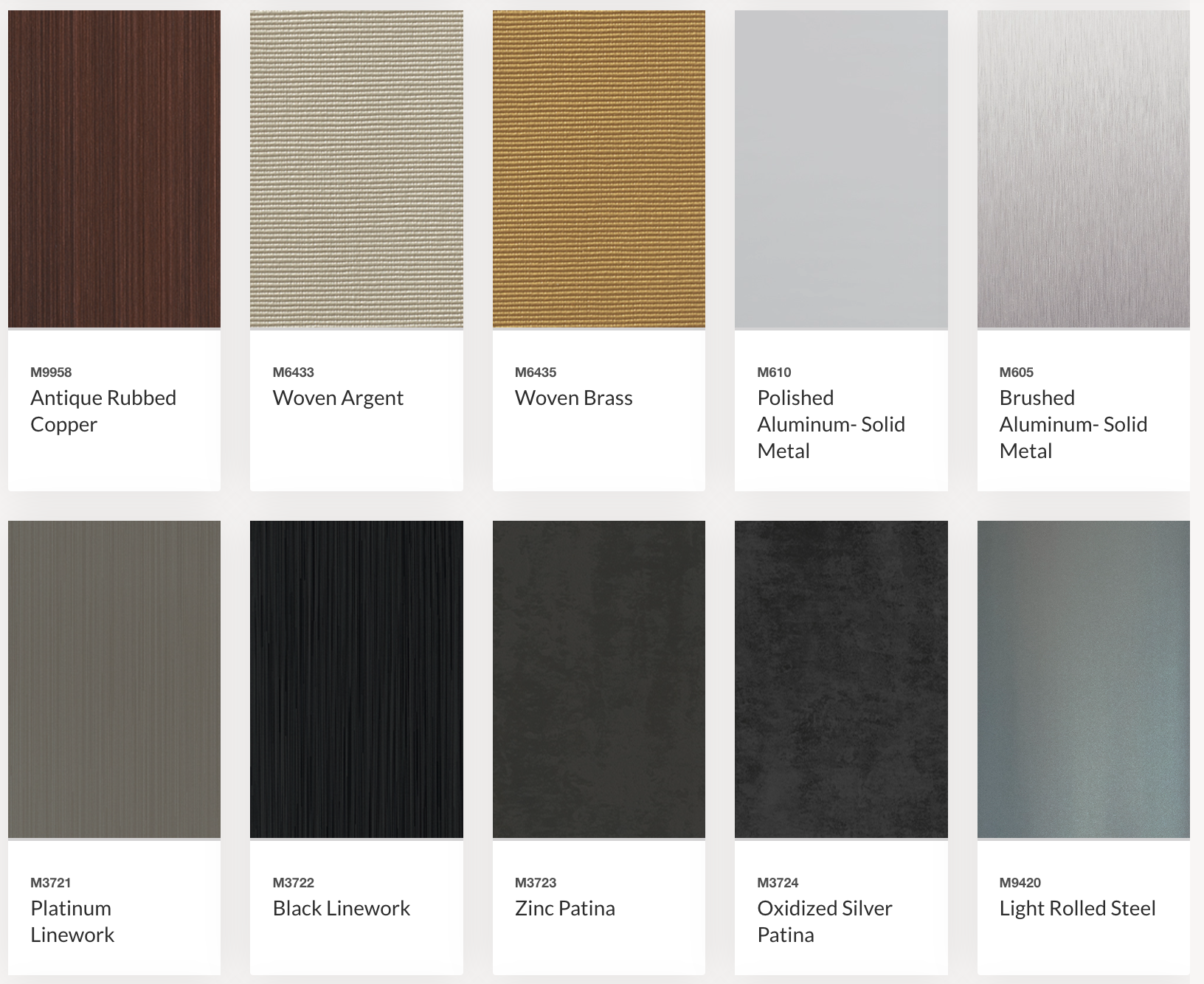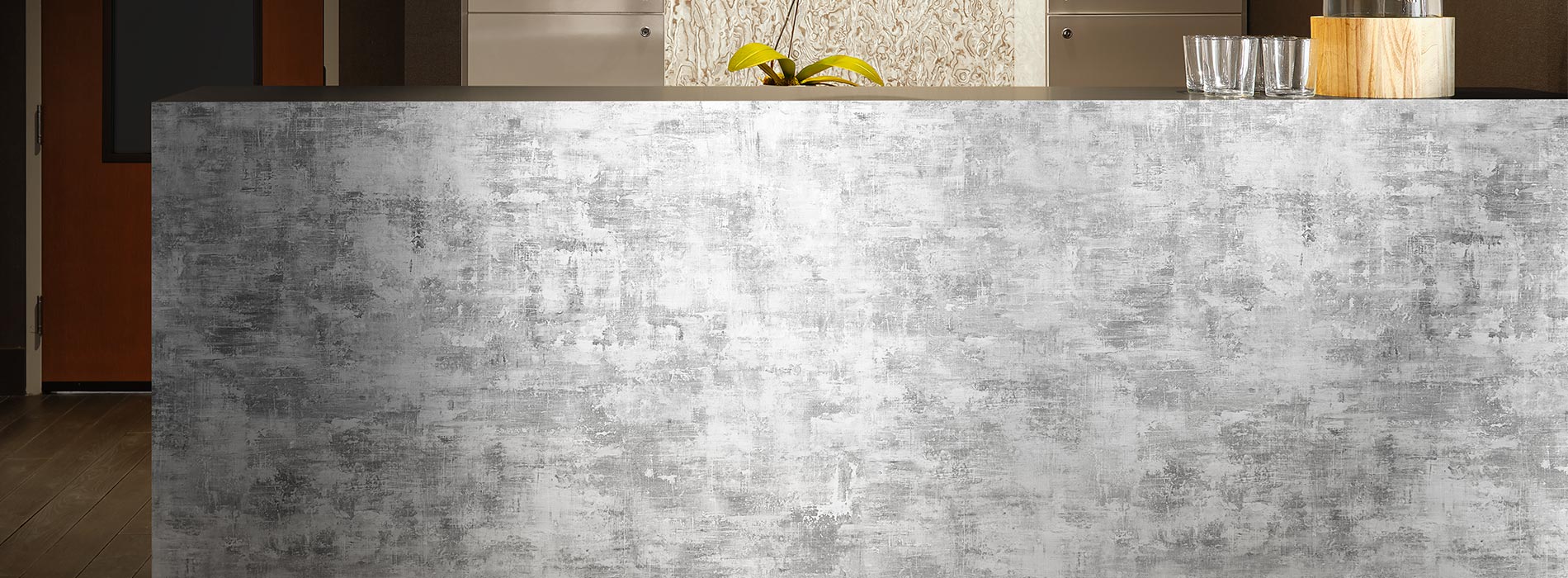Upscale hospitality spaces are a challenge for interior architects and designers. Guests expect that the décor will be elegant and beautiful, contributing to an ambience of luxury, but the materials used must complement a variety of design aesthetics while also being durable. Ideally, these qualities should be blended into a refined-appearing and easy-to-maintain material.
DecoMetal® by Formica Corporation perfectly fits the bill. AEC firms working on commercial hospitality projects will find that this product creates stunning vertical spaces in environments like hotel lobbies, conference centers, and high-end office buildings. DecoMetal® can be used on walls, furniture, displays, signage, exhibits, and even on front of or behind hospitality desks to create a stunning first impression for guests entering the property.
A Designer’s Dream for Lustrous Color and Sheen
Available in 45 different textures and colors, these metal finishes can enhance the aesthetic of any design concept. These include a variety of rubbed metals, modern industrial styles, woven textures, brushed and polished surfaces, rolled steel, satin aluminum, and many more, in colors ranging from mirror-like silver to linen-textured black, and everything in between. These designs are available in two versions: DecoMetal® laminate, which consists of metal foil laminated over a phenolic core; and DecoMetal® solid metal aluminum sheets, with polished or brushed, lacquered surfaces.
- The popular DecoMetal® line was recently extended with the addition of five new selections to the existing Rubbed Brass collection and an all new Metallic series, featuring patterns with artistically aged and patinated cross-brushing and expansions.
- DecoMetal® sheets are available as four- by eight-foot or four- by ten-foot panels and are finished with a protective coating that enhances their durability on vertical surfaces, essential in busy hospitality environments.

No matter if the interior space is ultra-modern, neo-industrial, traditional, contemporary, or something eclectic and unexpected — beautiful metallic surfaces heighten the sense of elegance. From dark patina for a clubroom-style aesthetic to a bright gold polished aluminum evoking a ballroom — if a decorator can imagine it, there’s a finish for that.
DecoMetal® as a Design Element
Meghan Howell, Creative Director at Formica Corporation, provides a couple of examples that illustrate how DecoMetal® can be used to craft a stunning interior. “I once saw our M9428 Copper Stainless as a dramatic curved wall that separated a bar from the main dining area in a restaurant,” she relates. “As the day progressed, the DecoMetal® caught and reflected the changing natural light, creating an almost kinetic effect.”
There are endless other possibilities, given the number of available finishes. She adds, “One of my favorite applications was a boutique wine bar that was attached to a trendy hotel. M8422 Black Patina, with its dark, antiqued texture, was applied to adjustable panels that were movable to create a series of intimate dining nooks. These could also be opened to frame a large community dining table.” She notes that the patina of the metal added depth and character to the space while still being functional.
This combination of beauty and practicality makes DecoMetal® an essential part of an interior designer’s toolkit for hospitality design, she observes. “You get the luxe and sparkle of the real metal foil without the weight of a solid metal panel.”
For designers considering how to best take advantage of the unique features of DecoMetal®, Howell suggests, “Consider your lighting and how it will interact with the surface to get the full ‘wow’ effect you’re looking to create. And think beyond the flat surface — don’t limit the application to merely straight walls.” Instead, she suggests applying it to a curved wall, sculptural accent, or decorative room dividers.
How to Maintain DecoMetal® Applications
The luxurious appearance of DecoMetal® doesn’t mean it is hard to clean and maintain — in fact, it’s quite the opposite. This is an important consideration in high-traffic areas like commercial environments, where numerous people may be touching and brushing up against it.
DecoMetal® is easily cleaned with a damp cloth and mild detergent. For disinfecting, bleach or isopropyl alcohol will work well without damaging the surface. After cleaning or disinfecting, simply rinse the DecoMetal® with warm water and dry it, which will allow it to retain its original luster and beauty after repeated cleanings.
Premium Craftsmanship Shines Through
Howell notes that both DecoMetal® metal laminate and DecoMetal® solid metals are beautiful solutions for interior hospitality projects, although she recommends solid metal laminate when the intended application presents a tighter, curved radius.
The elegance of DecoMetal® and the wide palette of available colors and finishes make it an easy choice for commercial architects and designers looking to incorporate high-end elements within hospitality environments. And because of its easy maintenance, it’s a natural choice for facility owners as well.
Related Stories
| Aug 11, 2010
RMJM unveils design details for $1B green development in Turkey
RMJM has unveiled the design for the $1 billion Varyap Meridian development it is master planning in Istanbul, Turkey's Atasehir district, a new residential and business district. Set on a highly visible site that features panoramic views stretching from the Bosporus Strait in the west to the Sea of Marmara to the south, the 372,000-square-meter development includes a 60-story tower, 1,500 resi...
| Aug 11, 2010
San Bernardino health center doubles in size
Temecula, Calif.-based EDGE was awarded the contract for California State University San Bernardino's health center renovation and expansion. The two-phase, $4 million project was designed by RSK Associates, San Francisco, and includes an 11,000-sf, tilt-up concrete expansion—which doubles the size of the facility—and site and infrastructure work.
| Aug 11, 2010
'Feebate' program to reward green buildings in Portland, Ore.
Officials in Portland, Ore., have proposed a green building incentive program that would be the first of its kind in the U.S. Under the program, new commercial buildings, 20,000 sf or larger, that meet Oregon's state building code would be assessed a fee by the city of up to $3.46/sf. The fee would be waived for buildings that achieve LEED Silver certification from the U.
| Aug 11, 2010
Five-star resort breaks ground on the Black Sea
Construction work has commenced on a five-star resort and leisure destination along the Black Sea coast in Batumi, Georgia. The RTKL-designed resort consists of two towers rising 86 and 58 meters over a two-story podium. The larger tower contains 250 guestrooms and suites while the smaller tower offers 78 residential apartments.
| Aug 11, 2010
Outdated office tower becomes Nashville's newest boutique hotel
A 1960s office tower in Nashville, Tenn., has been converted into a 248-room, four-star boutique hotel. Designed by Earl Swensson Associates, with PowerStrip Studio as interior designer, the newly converted Hutton Hotel features 54 suites, two penthouse apartments, 13,600 sf of meeting space, and seven "cardio" rooms.
| Aug 11, 2010
New hospital expands Idaho healthcare options
Ascension Group Architects, Arlington, Texas, is designing a $150 million replacement hospital for Portneuf Medical Center in Pocatello, Idaho. An existing facility will be renovated as part of the project. The new six-story, 320-000-sf complex will house 187 beds, along with an intensive care unit, a cardiovascular care unit, pediatrics, psychiatry, surgical suites, rehabilitation clinic, and ...
| Aug 11, 2010
Aloft hotel opens at Washington National Harbor
A partnership of five developers, including the John Hardy Group and Peterson Companies, have completed a 190-room aloft hotel at Washington National Harbor, a mixed-use retail/entertainment development in Oxon Hill, Md., near Washington, D.C. Designed in conjunction with David Rockwell and the Rockwell Group, the aloft prototype offers atmospheric public spaces designed to draw guests from the...
| Aug 11, 2010
D.C. gets sweeter with expanded green eatery
Greens Restaurant Group has expanded its popular salad and yogurt eatery, sweetgreen, to two neighborhoods in the Washington, D.C., area, Dupont Circle and Bethesda, Md. Designed by local architect CORE architecture + design, the experiential dining projects use salvaged hickory for the walls, wood recycled from the old bowling alleys for the tables and chairs, and sustainable paper/dye product...
| Aug 11, 2010
Manhattan's latest boutique hotel will be LEED Silver certified
New York-based developer Tribeca Associates has commissioned Brennan Beer Gorman Architects to design its latest mixed-use office and boutique hotel at 330 Hudson Street. Located in the downtown Hudson Square area of Manhattan, the LEED-Silver development will involve the redevelopment of a historic, eight-story warehouse building into 292,000 sf of office space, 15,000 sf of retail space, and ...







